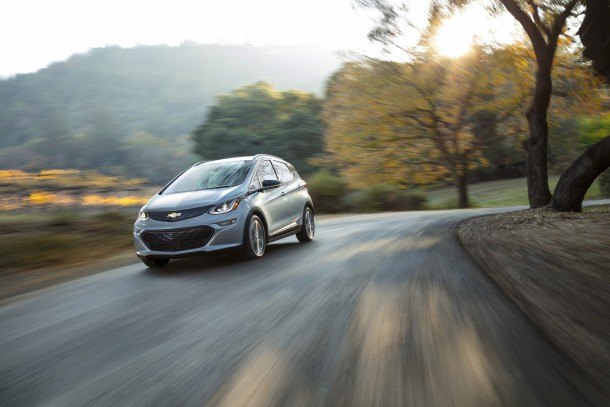Relax, the Government Isn't Taking Away Your EV Tax Credit

Depending on who you talked to, the looming removal of the $7,500 federal tax credit for electric vehicles was either no big deal, or akin to the firebombing of Mother Earth. Much disagreement existed even among the ranks of environmentalists and EV proponents.
Well, worry no more, EV fans. You too, automakers.
The GOP’s revised tax bill, released late Friday, does not do away with the EV tax credit. The public will continue footing part of the bill for every Tesla Model 3, Chevrolet Bolt, etc, for the foreseeable future. At least until an automaker reaches its 200,000-vehicle cap.
In the wrestling match that ensued over the proposed elimination, it looks like the Senate pinned the House.
It was House Republicans who initially proposed cancelling the credit as part of a broad range of tax reforms. Nuh uh, said the Senate in its own tax reform bill. Like many EV proponents, as well as a coalition of automakers, senators felt the elimination of the EV tax credit would cut a fledgling technology off at the knees.
With electric vehicles still not in the mainstream, losing the incentive could have crippled sales of EVs and negatively impacted the automakers — domestic and foreign — currently building (or planning to build) EVs in the United States. Limited range, a lack of fleshed-out charging infrastructure, and a higher sticker price remain chief concerns for buyers. Prices are falling as battery technology advances, but it’s a slow ramp-up.
Under a law passed by President Obama, EV buyers are eligible for a $7,500 federal tax credit (in addition to state or local incentives) until that particular automaker builds 200,000 of them. New buyers can receive the credit for three months after the automaker reaches the cap, after which the credit is halved, then halved again, then eliminated. Tesla and Nissan, having sold the highest number of EVs in the U.S., are furthest down the road to elimination.
Sales of battery electric vehicles rose 24.3 percent in November, pushing the segment’s take rate to 0.61 percent of the market. Over the calendar year, the EV take rate is 0.58 percent. Small potatoes in the grand scheme of things, but higher than 2016’s 0.45-percent take rate.
Sales of plug-in hybrids, which are not eligible for the full tax credit, rose 2.5 percent in November. The take rate last month was identical to that of EVs. Put together, the amount of vehicles sold with a charging plug in November stands at 1.22 percent of the U.S. market.
[Source: Reuters] [Image: General Motors]

More by Steph Willems
Latest Car Reviews
Read moreLatest Product Reviews
Read moreRecent Comments
- David Murilee Martin, These Toyota Vans were absolute garbage. As the labor even basic service cost 400% as much as servicing a VW Vanagon or American minivan. A skilled Toyota tech would take about 2.5 hours just to change the air cleaner. Also they also broke often, as they overheated and warped the engine and boiled the automatic transmission...
- Marcr My wife and I mostly work from home (or use public transit), the kid is grown, and we no longer do road trips of more than 150 miles or so. Our one car mostly gets used for local errands and the occasional airport pickup. The first non-Tesla, non-Mini, non-Fiat, non-Kia/Hyundai, non-GM (I do have my biases) small fun-to-drive hatchback EV with 200+ mile range, instrument display behind the wheel where it belongs and actual knobs for oft-used functions for under $35K will get our money. What we really want is a proper 21st century equivalent of the original Honda Civic. The Volvo EX30 is close and may end up being the compromise choice.
- Mebgardner I test drove a 2023 2.5 Rav4 last year. I passed on it because it was a very noisy interior, and handled poorly on uneven pavement (filled potholes), which Tucson has many. Very little acoustic padding mean you talk loudly above 55 mph. The forums were also talking about how the roof leaks from not properly sealed roof rack holes, and door windows leaking into the lower door interior. I did not stick around to find out if all that was true. No talk about engine troubles though, this is new info to me.
- Dave Holzman '08 Civic (stick) that I bought used 1/31/12 with 35k on the clock. Now at 159k.It runs as nicely as it did when I bought it. I love the feel of the car. The most expensive replacement was the AC compressor, I think, but something to do with the AC that went at 80k and cost $1300 to replace. It's had more stuff replaced than I expected, but not enough to make me want to ditch a car that I truly enjoy driving.
- ToolGuy Let's review: I am a poor unsuccessful loser. Any car company which introduced an EV which I could afford would earn my contempt. Of course I would buy it, but I wouldn't respect them. 😉


































Comments
Join the conversation
The tax rebate is wrong for a variety of reasons but I find it especially appalling that they failed to cap the price of the vehicles eligible for it. Can Democrats and Republicans at least agree to the following: 1. The only way to get any real environmental benefit from EV's is to sell mainstream models that sell by the millions. It makes scarcely little environmental impact to subsidize 80-140k+ cars as the market for those cars is a tiny percentage of the overall market. 2. The wealthy don't need a 7500$ rebate on their taxes and it may not factor into their decision to buy a trendy electric car. People that can afford to spend 80-140k on a vehicle will probably buy it regardless of the 7500$ tax rebate. At the margins there might be a few stretch buyers depending upon the rebate, but, again, what does a few marginal buyers in a 16 million annual auto market have to do with the environment? At a minimum, we should all be able to agree that any tax rebate should be available for cars that cost less than 50k.
So much for moderation.